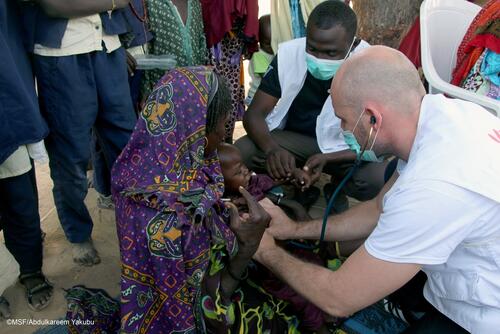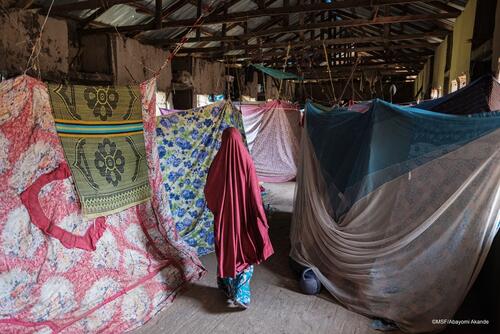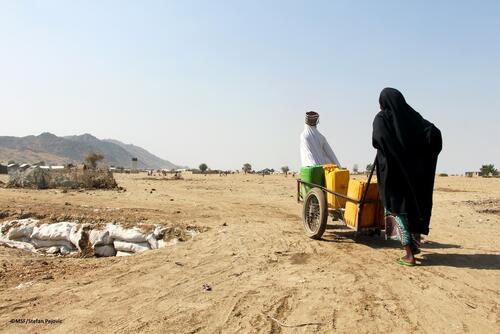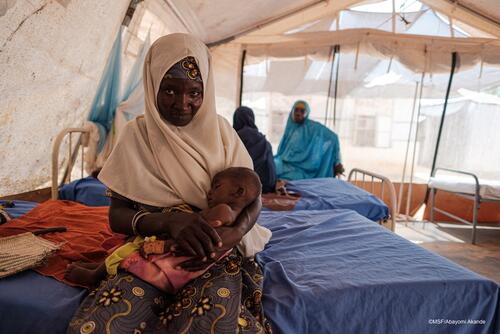Nigeria has some of the highest number of deaths from malaria worldwide. Usually, peak malaria season takes place during the rainy season from August to mid-October, when mosquitoes breed, after which patient numbers begin to decrease. This year, however, medical teams from Médecins Sans Frontières (MSF) working in northeast Nigeria’s Borno state have witnessed a spike in malaria cases even into the dry season.
During this year’s rainy season, MSF teams conducted or supported four rounds of seasonal malaria chemoprophylaxis, which prevents malaria, in different locations across Borno state, including in camps for displaced people. Our teams have also been supporting the Ministry of Health by carrying out seasonal malaria chemoprophylaxis in Gwange district and in informal camps for displaced people in Maiduguri.
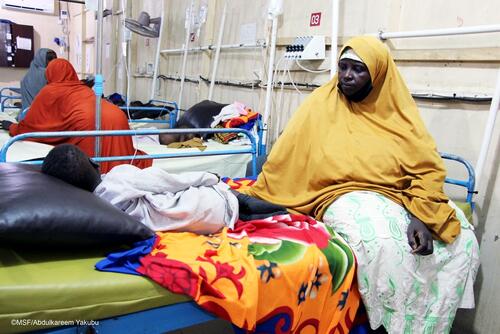
The campaign was aimed at children aged between three months and five years. MSF delivered more than 350,000 doses in the first three rounds, while the Nigerian Ministry of Health had planned to reach around two million children in total.
The fourth round of the campaign was meant to be carried out during the rainy season in mid-October, but shortages of medical supplies meant that it was delayed until mid-November.
Despite the preventive campaign, a number of young children died in hospital from the disease.
In response to the high numbers of people with malaria and the shortage of antimalarials, we have provided the Ministry of Health and other organisations with 120,000 antimalarial tablets after COVID-19 restrictions disrupted or delayed the import of antimalarials to Nigeria.
Our teams have also distributed mosquito nets to people across Borno state, including in Banki camp for displaced people. In Banki, our teams are also carrying out rapid malaria tests and providing treatment to people who test positive, as well as malnutrition screening for children.
"We’re a family of eight and we have only two mosquito nets – they’re not enough for us,” says Bintu, a resident of Banki camp whose son Ali died of malaria some years ago, when he was just two years old. “All my [other] children recently had seasonal malaria chemoprophylaxis and they are all doing fine."
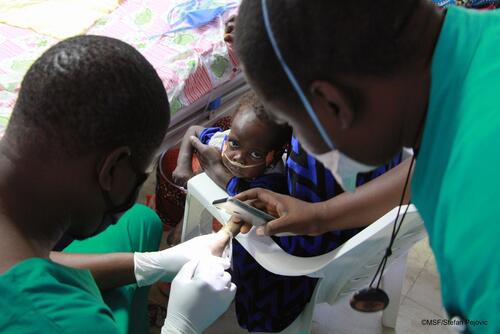
Parents, community leaders and the public should bring sick children to a hospital as soon as any of the malaria symptoms are noticed, as it is essential to treat malaria at an early stage to save lives.Jacob Maikere, MSF medical coordinator
Hussaini, aged five, is being treated for malaria in Gwange hospital, cared for by his grandmother, Hajja.
“He has been having this sickness for about a month, though he has sickle cell anaemia as well,” says Hajja. “If it weren’t for MSF, I wouldn’t have been able to afford his treatment, because Hussaini lost his parents and I too have been alone since my husband died."
Hussaini arrived at the hospital just in time for his treatment to be successful, but many patients are not brought in until it is too late to save them.
Our teams are keen to spread the message among communities that children should be brought to hospital as soon as they fall sick with malaria.
“Parents, community leaders and the public should bring sick children to a hospital as soon as any of the malaria symptoms are noticed, as it is essential to treat malaria at an early stage to save lives," says MSF medical coordinator Jacob Maikere.
After seeing the high number of malaria patients arriving at Gwange hospital from the Bolori neighbourhood, on the outskirts of Maiduguri, we have extended our activities to Bolori, as well as to the neighbourhoods of Dusman, Musari, Zambarmari and Ahmed Ghemra. In Bolori, our teams tested children for malaria and treated all those who tested positive. During the first half of November, they provided treatment to 323 children.
Bashir, aged two, was one of those who received treatment, after his mother Hafsat brought him to see the MSF mobile team.
“We could only give him paracetamol syrup when he started having this fever and a runny nose,” says Hafsat. “Me, my husband and our seven children all had malaria last month.”
The seasonal malaria chemoprophylaxis campaign in Borno state was challenging to implement, given the unstable context and the COVID-19 pandemic, but it is likely to have saved many children’s lives.
To save even more lives in a country that accounts for more than half of all malaria cases in West Africa, MSF is calling for seasonal malaria chemoprophylaxis to be given to all children aged from three months to ten years.
“We’ve noticed the positive effects of the campaign,” says Dr Emmanuel Berbain, MSF medical team leader in Gwange hospital. “Children under five mostly weren’t affected by malaria during the peak season. However, there were deaths among children over five. Because of the death rates, I think we should lobby for next year’s malaria prevention campaign to cover children up to the age of 10. It’s certainly possible, but it will require coordination, resources and preparation.”
MSF is working in seven states across Nigeria: Borno, Jigawa, Zamfara, Sokoto, Benue, Ebonyi and Rivers. Our teams have worked in Nigeria since 1996 and in Borno since 2014. In Borno state, we provide emergency treatment, surgery, malnutrition treatment, maternity and antenatal services, vaccinations, and the prevention and treatment of malaria and other diseases.



